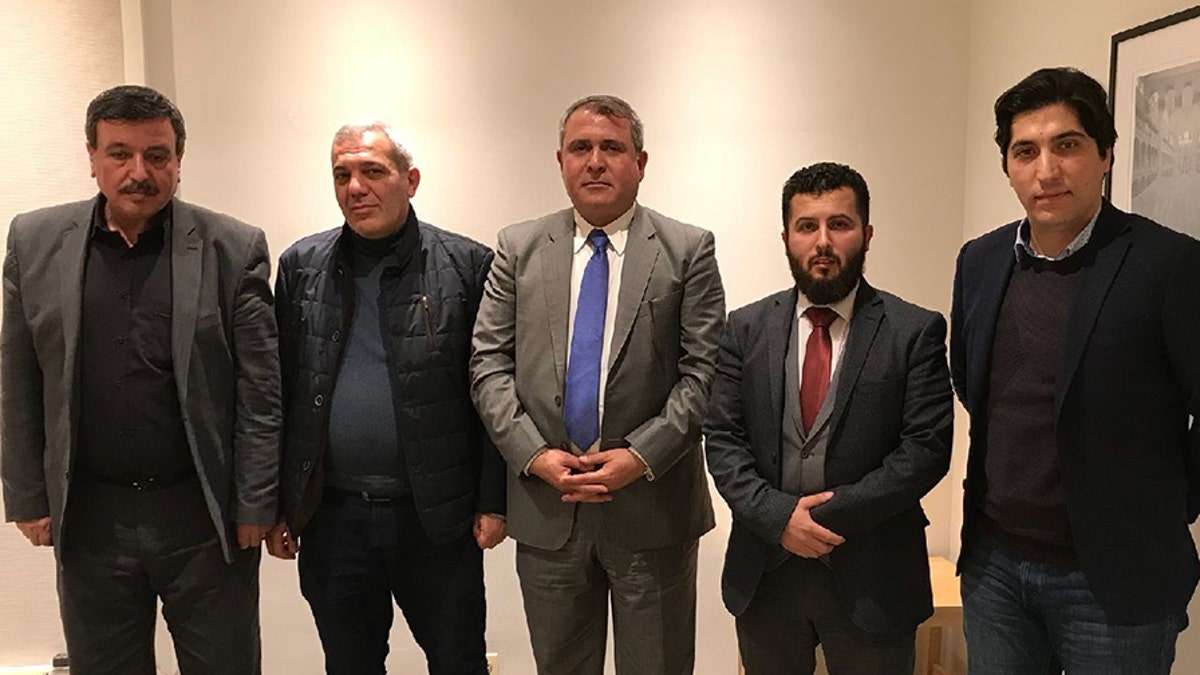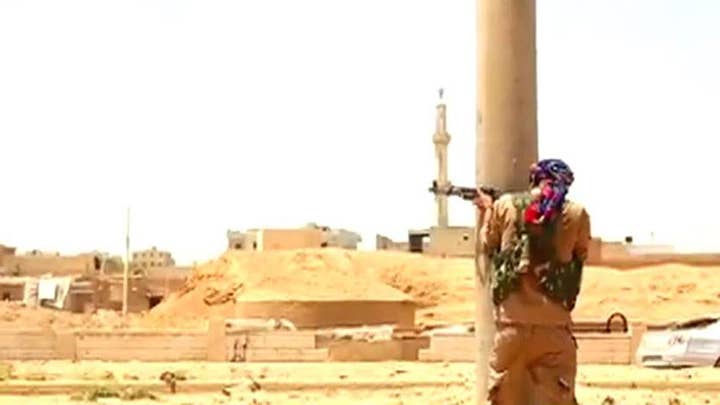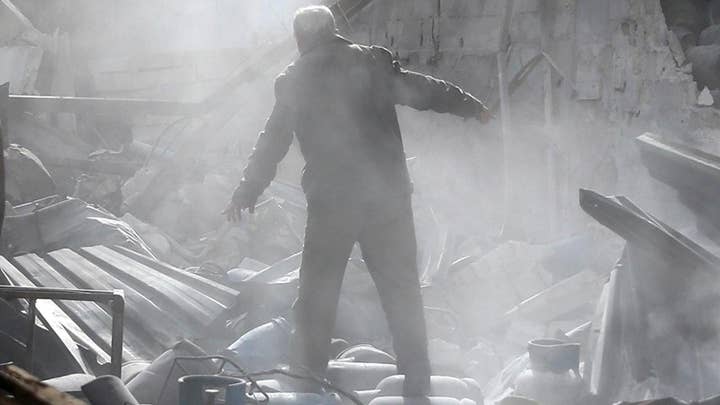
Members of a Free Syrian Army delegation — Saad Fahd Al Shweish, Khalid Aba, Yasir Al Haji, Mustafa Sejari and Osama Abu Zaid (from left to right) — are in Washington, D.C. to meet with the Trump administration about Russia and Iran. (Syrian American Council)
EXCLUSIVE – Leaders of the Free Syrian Army (FSA) are in Washington, D.C. where they will meet with White House officials Tuesday. Their goal is to increase cooperation between FSA and the Trump administration, and at the same time warn of the consequences of ceding control to Russia and Iran.
Last week they made their case to Congress.
The Free Syrian Army was described to Fox News as the military wing of the Syrian opposition, and it has a small number of members who had been trained and armed by the Pentagon through the train and equip program that ended in 2015. The FSA says it successfully fought against ISIS and Iranian militias. They claim to have approximately 60,000 troops. Its leaders say it has been reformed, and now employs rules of engagement similar to that of the U.S. military.
Meanwhile, their leaders warn of an oncoming catastrophe in Idlib, one of the last major strongholds of the opposition in Syria. They say they are facing a three-pronged attack from Russia, Iran and forces loyal to Syrian President Bashar al-Assad.
Meanwhile the Russians, Iranians and Turks are set to launch another round of talks at the end of the month. But members of the FSA delegation have warned the Trump administration not to trust the Russians on Syria.
“The Russians keep lying. They never actually do what they promise in negotiations,” said Osama Abu Zaid, who was a senior negotiator with Russia during the fall of Aleppo and the Astana talks.
Abu Zaid added, “The evidence is clear that Russia will not allow us democracy or independence. Russia is fighting with all its might to preserve the brutal security apparatus it has built for the Assad regime. This is our main challenge now: to rebuild the security services into institutions that are led by professionals working to protect Syrians and their democratic freedoms.”
The Russians fired back earlier Monday in Moscow: Russian Foreign Minister Sergey Lavrov accused the U.S. of not wanting to “maintain Syria’s territorial integrity.”
Members of the FSA delegation are pushing for more help from the Trump administration. “We aspire to such cooperation because we cannot trust Russia, which provides unlimited air support, all types of military support, and political support in international forums to the regime,” Saad Fahd Al-Shweish, also a part of the FSA delegation who was the former head of the Raqqa Provincial Council, told Fox News. He added, “We cannot accept Russia as an ally or partner while this support continues.”
Since the uprising began against the Assad regime in 2011, estimates of the number of Syrians killed range from 400,000 to nearly half a million.
Yasir Al-Haji heads the Foreign Relations office of the Syrian Interim Government. He said the main purpose of their current trip is to, “Alert the administration of the Russian-Iranian threat to Syrians and the future of Syrians.” He warned, “Iran in particular seeks to control Syria, Lebanon, and Iraq, and carve a land bridge from the Persian Gulf to the Mediterranean. Iran wants to become a big power, possibly with nuclear weapons as well, which will make it even harder to confront them.”
Khalid Aba, another crucial member of the delegation, is also the political chief of the Levant Front, also known as Jabhat al-Shamiyah. He said his group was CIA-vetted and that they spearheaded rebel fighting against ISIS in Aleppo.
He said, “Russia sees in Syria a chance to expand its global influence at the expense of the U.S. It wants to acquire a Mediterranean port, control the oil wells, preserve its Assadist proxy, and use Syria’s key geopolitical location as a means of influence in the Middle East. All this will give Russia further leverage in future negotiations with the U.S. on other issues. Therefore, while Russia uses the regime to justify its presence in Syria, Russia is in fact an occupier.”
The FSA is not alone in their concerns: David Adesnik, a Syria analyst at the Foundation for Defense of Democracy (FDD), a nonpartisan research institute focusing on national security and foreign policy, told Fox News that 2017 was a very good year in Syria for the likes of Russia, Iran, Hezbollah and Assad, but 2018 could provide an opening for the Trump administration to act.
“The way to start turning this around is to help the local partners who worked with us to defeat ISIS to take the next step and consolidate their hold of the territory they liberated in northeastern Syria,” Adesnik said. “Those areas have important oil and gas assets, which Assad wants to control. If our partners hold them, it would be the most important card in our hand at the negotiating table.”
Another FSA leader attending the talks is Mustafa Sejari. He is the founder of the Motassem Brigade, which he says was supported by the Pentagon. Sejari’s brigade is credited with leading the charge against ISIS in Northern Syria. Sejari told Fox News that he won’t give up the fight, “because it is impossible to return to the pre-war days. History teaches us that dictators cannot succeed in suppressing the popular will. The Syrian people have already decided to fight for their freedoms, and there is no going back.”





















